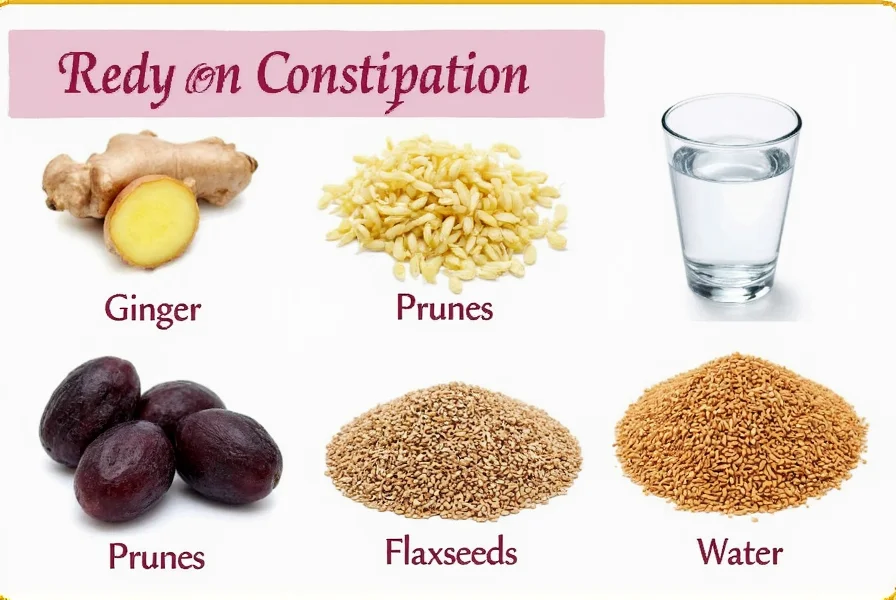Constipation affects millions worldwide, prompting many to seek natural solutions beyond over-the-counter medications. Ginger, a centuries-old remedy in traditional medicine systems, has gained attention for its potential digestive benefits. While not a miracle cure, understanding how this common spice might support bowel regularity requires examining both traditional uses and modern scientific evidence.
The Science Behind Ginger and Digestive Health
Ginger contains bioactive compounds, primarily gingerols and shogaols, which interact with the digestive system in several ways. Research indicates these compounds may stimulate gastric motility—the muscular contractions that move food through your digestive tract. A 2017 review published in Food Science & Nutrition noted ginger's potential prokinetic effects, suggesting it could help accelerate gastric emptying.
Unlike laxatives that work primarily in the colon, ginger appears to influence upper digestive function, which might indirectly support overall bowel regularity. However, most studies focus on ginger's effects on nausea, gastric emptying, and motility disorders rather than constipation specifically. The evidence connecting ginger directly to constipation relief remains preliminary and primarily based on animal studies or small human trials.
How Ginger Might Help With Constipation
Ginger's potential benefits for constipation stem from three primary mechanisms:
| Mechanism | How It Works | Scientific Support Level |
|---|---|---|
| Gastrointestinal motility enhancement | Stimulates smooth muscle contractions in the digestive tract | Moderate (primarily animal studies) |
| Anti-inflammatory properties | Reduces gut inflammation that can contribute to motility issues | Emerging evidence |
| Enzyme stimulation | Potentially increases digestive enzyme production | Limited evidence |
These mechanisms suggest ginger could support digestive function, but they don't guarantee relief from constipation. Individual responses vary significantly based on the underlying cause of constipation, overall health status, and ginger preparation method.
Evidence Review: What Research Says
A 2020 systematic review in Complementary Therapies in Medicine examined ginger's effects on gastrointestinal disorders. While the review noted ginger's potential benefits for functional dyspepsia and nausea, it highlighted the lack of robust clinical trials specifically investigating ginger for constipation treatment.
One small human study published in World Journal of Gastroenterology found that ginger supplementation improved gastric emptying in patients with functional dyspepsia, which shares some pathophysiological mechanisms with constipation. However, researchers cautioned against extrapolating these results directly to constipation treatment without further investigation.
Traditional medicine systems like Ayurveda and Traditional Chinese Medicine have used ginger for digestive complaints for centuries, but these historical uses don't constitute scientific evidence for modern medical applications. The placebo effect and general warming properties of ginger may also contribute to perceived benefits.
How to Use Ginger for Constipation Relief
If you're considering ginger as part of your approach to managing occasional constipation, several preparation methods exist:
Ginger Tea Preparation
Fresh ginger tea remains the most recommended method for digestive support. To prepare:
- Peel and slice 1-2 inches of fresh ginger root
- Boil in 2-3 cups of water for 10-15 minutes
- Strain and optionally add lemon or honey
- Drink 1-2 cups daily, preferably before meals

Dosage Considerations
Most studies on ginger's digestive effects use doses equivalent to 1-3 grams of fresh ginger daily. Exceeding 4 grams daily may cause side effects. For constipation relief specifically, there's no established optimal dose, but starting with smaller amounts and gradually increasing is advisable.
Safety and Important Considerations
Ginger is generally safe for most adults when consumed in food amounts or moderate supplemental doses. However, certain considerations apply when using ginger for constipation:
- Potential side effects: Heartburn, mouth irritation, or stomach upset in sensitive individuals
- Medication interactions: May enhance effects of blood thinners like warfarin
- Contraindications: Avoid if you have gallstone disease or are scheduled for surgery
- Pregnancy: Consult your healthcare provider before using therapeutic doses
Chronic constipation (lasting more than three weeks) warrants medical evaluation rather than self-treatment with ginger or other home remedies. Persistent constipation can indicate underlying conditions like irritable bowel syndrome, hypothyroidism, or neurological disorders that require professional diagnosis and treatment.
Complementary Approaches to Constipation Relief
Ginger works best as part of a comprehensive approach to digestive health. Consider combining ginger with these evidence-based strategies:
- Adequate hydration: Drink at least 8 glasses of water daily
- Dietary fiber: Increase intake of fruits, vegetables, and whole grains gradually
- Physical activity: Engage in regular moderate exercise like walking
- Establish routine: Try to have bowel movements at the same time daily
- Stress management: Practice relaxation techniques as stress affects digestion
Remember that what works for one person may not work for another. Constipation has multiple potential causes, and effective treatment often requires addressing the specific underlying issue rather than relying on a single remedy.
When to Consult a Healthcare Professional
While occasional constipation is common and often resolves with lifestyle changes, seek medical advice if you experience:
- Constipation lasting longer than three weeks
- Blood in your stool
- Unexplained weight loss
- Severe abdominal pain
- Sudden changes in bowel habits
These symptoms could indicate more serious conditions requiring professional diagnosis and treatment. Never use ginger or other home remedies to avoid necessary medical care for persistent digestive issues.
Conclusion
Ginger shows promise as a supportive element in managing occasional constipation due to its potential effects on digestive motility. However, the scientific evidence remains limited, and it shouldn't replace medical evaluation for persistent symptoms. When used appropriately as part of a holistic approach to digestive health, ginger may provide gentle support for some individuals experiencing mild constipation. Always prioritize evidence-based approaches and consult healthcare professionals for ongoing digestive concerns rather than relying solely on home remedies.

Does ginger really help with constipation relief?
Ginger may help some people with mild constipation due to its potential prokinetic effects that stimulate digestive tract movement. However, scientific evidence specifically for constipation relief is limited, and results vary between individuals. It's not a guaranteed solution and works best as part of a comprehensive approach to digestive health.
How long does it take for ginger to help with constipation?
If ginger provides relief, effects typically occur within 30-60 minutes after consumption, as it stimulates digestive processes. However, for chronic constipation, ginger alone is unlikely to provide immediate or complete relief. Consistent use over several days combined with adequate hydration and fiber may yield better results for occasional constipation.
What's the best way to prepare ginger for constipation relief?
Fresh ginger tea is generally considered the most effective preparation. Peel and slice 1-2 inches of fresh ginger root, boil in 2-3 cups of water for 10-15 minutes, then strain. Drink 1-2 cups daily, preferably before meals. Fresh ginger contains higher levels of active compounds than dried or powdered forms, potentially making it more effective for digestive support.
Can ginger make constipation worse?
For most people, ginger doesn't worsen constipation, but individual responses vary. In rare cases, excessive ginger consumption might cause heartburn or stomach upset that could indirectly affect digestion. People with certain conditions like intestinal obstruction should avoid ginger. If you notice worsening symptoms after consuming ginger, discontinue use and consult a healthcare provider.
How does ginger compare to other natural constipation remedies?
Ginger works differently than common natural remedies like prunes or psyllium. While prunes provide fiber and sorbitol, and psyllium adds bulk, ginger primarily stimulates digestive tract motility. It's generally milder than strong laxatives but less immediately effective than osmotic agents. For best results, combine ginger with adequate hydration, fiber-rich foods, and regular exercise as part of a comprehensive approach to digestive health.











 浙公网安备
33010002000092号
浙公网安备
33010002000092号 浙B2-20120091-4
浙B2-20120091-4